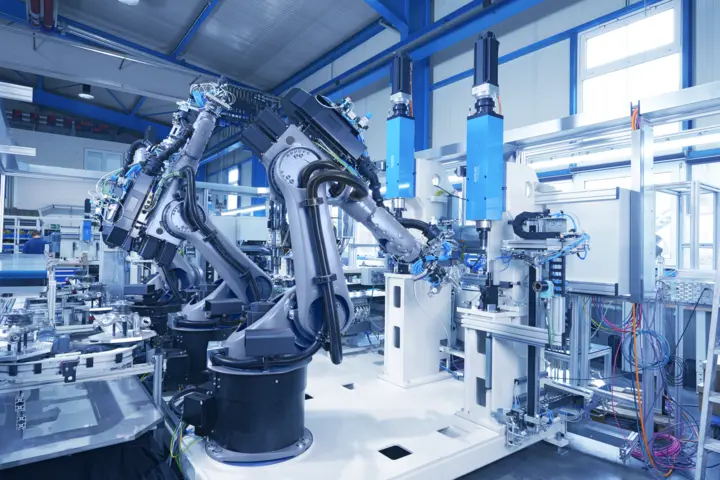More cost-effective – more efficient – more transparent
How are these developments actually impacting production by the automotive industry and its suppliers? First and foremost, there are the advances linked to Industry 4.0 – driven in no small measure by high consumer expectations: vehicles are becoming more individual and more networked, with ever-increasing numbers of variable individual components, not to mention driver assistance and entertainment systems.
As well as ensuring cost-effective and efficient operation, production lines across the world now have to meet requirements for flexibility and modularization in response to these developments: cells and entire production lines should be adaptable to changing conditions as quickly as possible; digital monitoring and control of the entire factory, even including microprocesses, is now much closer to becoming a reality. There is also a related requirement for 100 percent traceability and transparency – ranging, for example, from individual sensors and their data to process monitoring, MES and the ERP: this will enable manufacturers not to lose track of the vast variety of versions they produce, ensuring that they are always able to supply information to third parties while constantly optimizing their processes.
The assembly process is a good example of this: a car consists of a large number of individual parts – depending on the model, there may be more than 10,000 of them, mostly made of metal or plastic; and they have to be permanently fastened to one another. Many of the relevant processing steps are already performed by the suppliers. They use an enormous variety of fastening techniques to join the parts – examples include screwing and bolting, welding, bonding, and press-fit processes. As well as comprehensive measurement and testing technology for quality assurance of threaded joints, the Kistler Group also supplies electromechanical joining systems that are used for many manufacturing processes in the automobile industry and by suppliers to the automotive sector.
Digital control of assembly processes – from simple to complex
The diverse range of applications includes production of electrical drives (including the battery and power electronics applications) as well as assembly of wheel carriers and axle systems. Kistler offers a portfolio comprising six series of products with integrated sensor technology for force-displacement monitoring, each designed to meet the requirements for individual assembly steps:
- NCFN: Standard module for medium to high forces
- NCFH: Compact module with direct drive for highly dynamic applications
- NCFE: Cost-efficient module for simple joining processes
- NCFR: High-end module for joining with a rotary movement
- NCFT: Version for joining processes with small forces
- NCFS: Module for joining processes with a small center distance
The full range of available NC systems (NC: Numeric Control) covers an extremely wide range of forces from 0.01 to 600 kN – and their features ensure that users can overcome the challenges confronting the sector that were mentioned above. Thanks to highly accurate control with precise cutoff in response to force, force change, displacement and additional criteria, NC joining systems combine exceptionally good protection for the manufactured parts with flexible usage. Together with the maXYmos NC process monitoring and control system from Kistler, they can be networked with smart production environments to ensure 100 percent transparency and traceability of the relevant production steps.
Electromechanical joining systems from Kistler also score high on cost-effectiveness and efficient use of resources: with advantages such as energy savings (of up to 80 percent as compared to hydraulic or pneumatic systems), reduced CO2 emissions (as much as two tonnes per year and joining module) and lower total cost of ownership (TCO), they fit seamlessly into the structural change in the automotive industry that was described above.
Electromechanical joining systems from Kistler can be adapted to the requirements of specific industrial sectors or customers – for example, in response to changes in production caused by the switch to New Energy Vehicles. To illustrate this point: a new variant of the NCFT joining module for small pressing forces was recently developed and is now available: the angled version features a stroke distance of 250 mm – significantly longer than the existing standard system (100 mm) – so it can meet requirements that arise in certain specific types of production. Development work is already in progress on yet more NC joining modules and product versions, and Kistler is always glad to produce new designs in response to customers' specific requirements.
Solution provider for the entire vehicle production value chain
Above and beyond its role in optimization and quality assurance for production processes, the Kistler Group has decades of experience in partnering with the automotive industry as a key provider of solutions for the entire value chain – from research and development through to production and assembly, as well as testing and road trials. Applications include measurement technology for engine development and optimization together with a complete portfolio for passive vehicle safety – including crash walls, full in-dummy sensor technology and the THOR dummy. Kistler also supplies an extensive range of sensor technology and software for optimizing vehicle dynamics, covering series development of passenger and commercial vehicles – and even motorsport. By no means least, the range of test stands and test automation solutions from Kistler – end-of-line or standalone – ensure high reliability and efficiency gains in multiple applications, including both production and trialing of New Energy Vehicles.



